#Inner Compass
Explore tagged Tumblr posts
Text
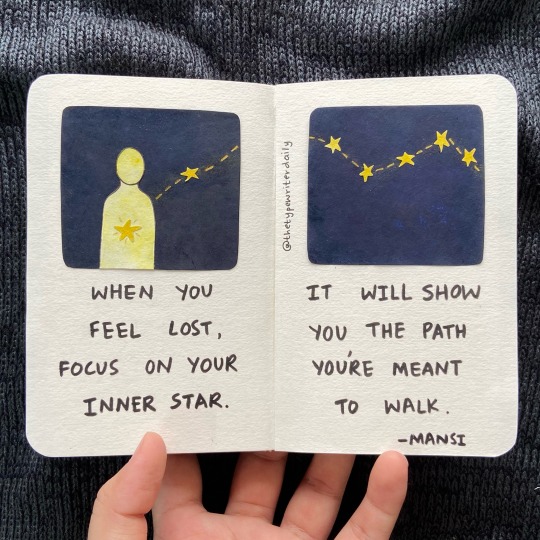
let your inner compass guide you 🧭🌌
#words#poetry#artist#love#heartbreak#spilled ink#art journal#journaling#lost#hopeful#inner compass#mental health#healing art#personal growth#healing journey#quotes#inspiring quotes
345 notes
·
View notes
Text

I am willing to experience heartbreak, rejection, failure and judgement. Not only do I love the possibility of my creative desires being completely fulfilled to my heart's content, I also love the process itself, the thrilling forward momentum of going after what I desire because it's an act of self-love in itself.
I prefer the sensation of unfolding and moving, always transforming and discovering, and becoming, even in my mistakes and failures, over the paralysis and inertia of doing nothing.
#our journey to balance#reflections#love#self love#awareness#self awareness#conscious living#inspiration#motivation#gratitude#awakening#spiritual growth#higher consciousness#inner thoughts#inner peace#inner compass#intuition#creative inspiration#creative process#mental health
2 notes
·
View notes
Video
youtube
The Inner Compass Forecast ~ July 21st
It’s time to align with your truth and trust your path — one sacred step at a time.
Each week, I tune into the moon’s phase, pull cards from my two personal oracle decks and the tarot, and offer sacred self-care guidance to help you begin the week centered, clear, and in resonance with your inner wisdom.
This week's lunar influence is from the bold and radiant New Moon in the sign of Leo which arrives on the 24th, it brings a dramatic surge of energy and serves as a catalyst for self-expression, confidence, and creative rebirth.
This isn’t just a forecast — it’s your invitation to come home to yourself. 🌙 Energetic themes 🃏 Oracle & tarot wisdom 🙏 Self-care reflections to support your journey 🧭 Inner compass activation
Watch this week’s episode now and let your soul lead the way.
#youtube#inner compass#moon phases#astrology#sacred self-care#tarot reading#oracle cards#intuitive guidance#inner peace#inner wisdom
0 notes
Text
Knowing your truth is important because it will set you free. It heals judgments from yourself or others. It reconnects you with your inner compass and values. Truths cut through illusions and confusion in order for clarity and light to emerge.
#my thoughts#personal post#my healing journey#my spiritual journey#my learnings#personal growth#spiritual growth#divine feminine#divine feminine energy#inner truth#truth#values#freedom#judgments#inner compass#confusion#clarity#light
0 notes
Text
Thursday Jupiter Day: Expanding My Truth, Rooted in Wisdom
#Abundance Energy#Affirmation Practice#Aligned Expansion#Amethyst Wisdom#Ancestral Wisdom#Belief Alchemy#Blessing Rituals#Citrine Confidence#Clarity of Purpose#Creative Growth#Divine Expansion#Divine Timing#Energetic Abundance#Energy Alignment#Faith Frequency#Golden Light Visualization#Healing through Visions#Higher Self Guidance#Inner Compass#Inner Knowing#Inner Truth#Intention Setting#Intuitive Living#Jupiter Alignment#Jupiter Blessings#Jupiter Day Energy#Jupiter Day Ritual#Jupiter Magic#Jupiter Vibes#Lapis Lazuli Power
0 notes
Text
With elegance and clarity, this lady (AI Facsimile) reminds us to trust our inner compass!
#AI#Artificial Intelligence#Lip Syncing via AI#Adobe After Effects CC#Photoshop#AI Facsimile#”LIVE FOR YOURSELF—NOT FOR OTHERS”#@esha.words#Embrace Your own Truth#Desires#Dreams#Breaking Free#Courage#Inner Compass#Your Own Heart#Heartfelt#Journey#Motivation#Authenticity#Live Boldly#Elegance#Clarity#Quiet Strength
0 notes
Text
A Survivor’s Guide to Overcoming People-Pleasing and Building Authentic Self
A Survivor’s Guide to Overcoming People-Pleasing and Building Authentic Self-Esteem – Rooted in Childhood Emotional Neglect Recovery
Do you ever find yourself nodding enthusiastically when every fiber of your being screams "No"? Do you instinctively offer help, even when your own plate is overflowing, leaving you simmering with silent resentment? Perhaps you spend your days calibrating your words and actions, constantly scanning others' faces for approval, desperately trying to preempt any flicker of disappointment. It’s a familiar tightrope walk, isn't it? A performance where the spotlight is always on you, but the applause never quite feels earned, and the real "you" remains hidden behind a carefully constructed façade.
This relentless urge to please, to conform, to make yourself palatable to everyone around you, is far more than just "being nice." I've seen it devour lives, leaving individuals feeling hollowed out, exhausted, and utterly disconnected from their own desires. It’s a silent epidemic, often masquerading as altruism, but at its heart, it’s a deep-seated craving for validation, a desperate attempt to earn love and acceptance that often stems from a wound so subtle, it's rarely spoken about: Childhood Emotional Neglect.
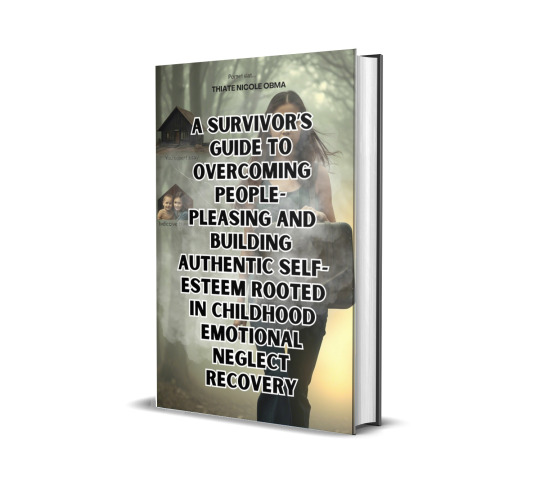
A Survivor’s Guide to Overcoming People-Pleasing and Building Authentic Self-Esteem – Rooted in Childhood Emotional Neglect Recovery : BUY EBOOK CLICK HARE
For years, I've walked alongside countless individuals on their journey from this shadow world of people-pleasing back into the vibrant light of authentic self-esteem. My own path, too, led me through similar landscapes of self-doubt and external validation. What I've learned, both personally and professionally, is that to truly dismantle the architecture of people-pleasing, we must first understand its foundations. And more often than not, those foundations are rooted in the emotional climate of our earliest years.
Unmasking the People-Pleaser: The Silent Scream of the Soul
Let’s talk about what people-pleasing truly looks like, beyond the polite smiles and helpful gestures. It’s the friend who always agrees, even when they vehemently disagree on the inside. It’s the colleague who takes on extra work, then grumbles privately about being taken advantage of. It’s the partner who suppresses their own needs to avoid conflict, only to explode later from bottled-up frustration.
The people-pleaser lives in a state of hyper-vigilance. Their antennae are always up, scanning the emotional atmosphere around them, trying to anticipate what others need, what they expect, what might make them happy. It’s a constant self-editing process, a meticulous curation of self, designed to minimize friction and maximize acceptance. The internal dialogue is often a whirlwind of "What if they get mad?" "What if they don't like me?" "I can't disappoint them."
This relentless outward focus comes at an enormous internal cost. You become a chameleon, changing your colors to blend into every social landscape. But chameleons, despite their adaptability, are ultimately camouflaged, losing their distinct identity. You feel a creeping resentment towards others for "making" you do things, when in reality, it's your own inability to say "no" that's the culprit. There's a gnawing sense of emptiness, a whisper that asks, "Who am I, really, beneath all this effort to be what everyone else wants?" This internal whisper can, over time, swell into a roar of anxiety, depression, and a profound sense of self-alienation. The well of your own energy runs dry, leaving you utterly depleted.
A Survivor’s Guide to Overcoming People-Pleasing and Building Authentic Self-Esteem – Rooted in Childhood Emotional Neglect Recovery : BUY EBOOK CLICK HARE
The Hidden Wound: Childhood Emotional Neglect (CEN)
When I work with clients trapped in the labyrinth of people-pleasing, we almost invariably trace the thread back to a common, often invisible, origin point: Childhood Emotional Neglect (CEN).
CEN isn't about abuse in the conventional sense. It's not about being hit, yelled at, or overtly mistreated. In many cases, CEN survivors grew up in homes where basic physical needs were met, where parents were well-meaning, and where, from the outside, everything might have appeared "normal." This is precisely why CEN is so insidious; it's the absence of something crucial, not the presence of something overtly harmful.
Imagine a child with a vibrant inner world, full of feelings, thoughts, and needs. In a healthy emotional environment, when that child expresses sadness, anger, joy, or curiosity, a parent responds. They might say, "I see you're upset," or "You seem excited!" They mirror the child's emotions, validate their experience, and teach them how to navigate their internal landscape. This isn't about fixing every problem, but about acknowledging the child's emotional reality.
In a CEN environment, this vital emotional mirroring is absent or inconsistent. The child expresses a feeling, but it's met with silence, dismissal, or even subtle disapproval. "Don't be silly," "You're too sensitive," "Just get over it." The parent might be preoccupied, emotionally unavailable, overwhelmed themselves, or simply unaware of the child's emotional needs. They might be physically present but emotionally distant, like a television turned off during a vibrant program.
The child, in this silent vacuum, learns a devastating lesson: their emotions are inconvenient, irrelevant, or even a burden. Their internal experience doesn't matter. There's a hungry void where emotional validation should be.
How CEN Fuels People-Pleasing and Erodes Self-Esteem: The Architect of the False Self
This emotional void creates a profound hunger in the child – a hunger for connection, for validation, for simply being seen and understood. And this hunger often leads to the development of a powerful coping mechanism: people-pleasing.
A Survivor’s Guide to Overcoming People-Pleasing and Building Authentic Self-Esteem – Rooted in Childhood Emotional Neglect Recovery : BUY EBOOK CLICK HARE
The Desperate Search for External Validation: If your internal emotional world is ignored, you learn that your value isn't inherent. It must be earned. The child, and later the adult, becomes a detective, constantly trying to figure out what external cues will bring a smile, a nod of approval, or a moment of acceptance. They become hyper-tuned to others' moods, adapting their behavior to elicit positive responses, because that’s the only way they learned to feel worthy or safe.
The Suppressed Self: To avoid causing a ripple, to avoid being "too much" or "too sensitive," the child learns to suppress their own authentic feelings, needs, and desires. They disconnect from their internal compass. If expressing sadness makes a parent uncomfortable, the child learns to push sadness down. If showing anger causes conflict, anger is locked away. Over time, this becomes automatic, leaving the adult unaware of what they truly feel or want, because they've practiced ignoring themselves for so long.
Fear of Abandonment and Rejection: At the core of CEN is a subtle, unspoken emotional abandonment. The child learns that their true self, their emotional self, is not acceptable or worthy of attention. This creates a deep-seated fear that if they ever show their true colors, if they ever set a boundary or express a dissenting opinion, they will be rejected, unloved, or completely abandoned. This fear drives the constant need to people-please, to maintain a perceived harmony at all costs.
Conditional Self-Esteem: When your worth is tied to how well you can please others, your self-esteem becomes a shaky edifice built on shifting sands. It's conditional. Every act of people-pleasing is an attempt to shore up this fragile sense of self. When someone approves, you feel a temporary surge of worth. When they disapprove, even subtly, your entire sense of self can crumble. There's no solid inner core of self-worth because that core was never properly nourished.
It's like a house built without a proper foundation. It might look perfectly fine from the outside, with freshly painted walls and charming windows. But every gust of wind, every tremor in the earth (every external judgment or perceived disapproval), threatens to bring it crashing down. The constant people-pleasing is the futile attempt to prop up walls that have no solid grounding.
The Path to Recovery: A Survivor's Guide to Authentic Self-Esteem
The good news is that you don't have to live in that drafty, unstable house forever. Building authentic self-esteem and dismantling the people-pleasing habit is a profound journey of recovery, one that involves compassionately re-parenting yourself and re-connecting with the parts of you that were left neglected. It's a survivor's journey, courageous and deeply rewarding.
Here are the essential steps I guide my clients through:
Step 1: Acknowledging the Neglect – Naming the Invisible Wound
This is arguably the most crucial and often the most difficult step. CEN is invisible, and many survivors feel guilty even considering it, thinking "My parents loved me, they did their best!" And they probably did. But love alone doesn't prevent emotional neglect. Acknowledging CEN means validating your own childhood experience: something essential was missing, and it affected you. It’s not about blaming your parents; it’s about understanding your own emotional history.
A Survivor’s Guide to Overcoming People-Pleasing and Building Authentic Self-Esteem – Rooted in Childhood Emotional Neglect Recovery : BUY EBOOK CLICK HARE
Practice: Reflect on your childhood. Were your emotions acknowledged? Did you feel comfortable expressing difficult feelings? Was there someone you could go to who consistently validated your internal experience? If not, allow yourself to acknowledge that void. Say it out loud: "My emotional needs were not consistently met as a child." Feel the truth of that statement, even if it brings a pang of sadness. This acknowledgement is the bedrock of healing.
Step 2: Reconnecting with Buried Emotions – Finding Your Inner Compass
For CEN survivors, emotions can feel foreign, dangerous, or simply "not there." Yet, emotions are our internal guidance system, telling us what we need, what feels right, and what feels wrong. Reconnecting with them is vital.
Practice:
Emotional Vocabulary: Start by building your emotional vocabulary. Beyond "good" or "bad," how do you really feel? Use an emotion wheel or list.
Body Scan: Practice mindfulness. Sit quietly and scan your body. Where do you feel tension, lightness, warmth, cold? Are there any subtle sensations associated with an emotion? Is that knot in your stomach anxiety? Is that tightness in your chest sadness?
"Name It to Tame It": When you feel overwhelmed or unsure, try to name the emotion. "I'm feeling frustration," "I'm feeling nervous." Just naming it can create a little space and reduce its intensity.
Journaling: Write freely about your day, your interactions, your feelings. Don't censor. Just get it onto the page. This helps externalize and process emotions that have been buried.
Step 3: Finding Your Authentic Voice – Setting Boundaries
This is the direct antidote to people-pleasing. Saying "no," expressing a different opinion, or stating your needs is terrifying for a CEN survivor because it threatens that perceived acceptance. But it's essential for reclaiming your self.
Practice:
Start Small & Low Stakes: Practice saying "no" to trivial things first. "No, thank you, I'm okay with water," instead of automatically accepting coffee. "No, I can't meet on Tuesday, how about Wednesday?"
"I Need Time": If you feel pressured, use a bridging statement: "Let me think about that and get back to you," or "I need to check my schedule." This buys you time to consult your internal compass rather than automatically defaulting to "yes."
The "No" Sandwich: When you do say no, you don't have to justify, argue, or over-explain. "Thanks for the offer, but I won't be able to make it." (Polite opening, clear "no," no explanation needed).
Expect Discomfort (and Guilt): The guilt and anxiety you feel when setting a boundary is a sign of progress, not failure. It's the old programming screaming. Acknowledge it, breathe through it, and remember you are protecting yourself. The discomfort will lessen over time.
Step 4: Cultivating Self-Validation – Becoming Your Own Best Parent
This is the heart of building authentic self-esteem. If you didn't receive enough external validation as a child, you must learn to provide it for yourself as an adult.
Practice:
Self-Praise: When you do something well, or even when you just show up and try, acknowledge it. "I handled that conversation well," "I stuck to my boundary," "I'm proud of myself for trying."
Internal Mirroring: When you feel a strong emotion, especially a difficult one, pause and say to yourself what you wish someone had said to you as a child: "It's okay to feel sad right now," "I understand why you're angry," "Your feelings are valid."
Trust Your Gut: Pay attention to your intuition. When faced with a decision, listen to that quiet inner voice. Practice honoring it, even if it goes against external pressures. The more you listen, the stronger it becomes.
Self-Compassion: Treat yourself with the same kindness and understanding you would offer a dear friend. When you make a mistake, instead of harsh self-criticism, offer yourself comfort and encouragement.
Step 5: Reclaiming Your Needs and Desires – What Do You Want?
When you’ve spent a lifetime focused on others' needs, your own can become utterly invisible, even to you. This step is about rediscovering what truly brings you joy, fulfillment, and a sense of purpose, independent of external approval.
A Survivor’s Guide to Overcoming People-Pleasing and Building Authentic Self-Esteem – Rooted in Childhood Emotional Neglect Recovery : BUY EBOOK CLICK HARE
Practice:
Needs Inventory: Make a list of your fundamental needs: rest, connection, creativity, quiet time, learning, adventure, etc. How well are they being met?
Desire Discovery: What are your authentic desires? What hobbies intrigue you? What books do you want to read? What causes do you care about? What kind of relationships do you truly crave? Start exploring without judgment or pressure.
Small Acts of Self-Nurturing: Start incorporating small things into your day that are purely for your pleasure or well-being, even if it feels "selfish" initially. A quiet cup of tea, 10 minutes of a hobby, a walk in nature. This signals to yourself that your needs matter.
Step 6: Building a Support System – The Power of Authentic Connection
As you embark on this journey, you’ll need people around you who can witness and support your authentic self, not just the people-pleasing façade.
Practice:
Seek Emotionally Responsive Relationships: Gravitate towards people who genuinely listen, validate your feelings, and respect your boundaries. These relationships are nourishing.
Practice Vulnerability (Selectively): Share a small, authentic feeling or boundary with a trusted friend or family member. See how they respond. This builds capacity for genuine connection.
Consider Professional Help: A therapist specializing in CEN or trauma recovery can be an invaluable guide. They provide a safe, validating space to process old wounds and build new emotional skills. This is not a sign of weakness, but immense strength and commitment to your well-being.
Step 7: Embracing Imperfection and Vulnerability – The Beauty of Being Real
The people-pleaser often strives for perfection to avoid criticism. Building authentic self-esteem involves letting go of this impossible ideal and embracing your beautiful, messy, imperfect human self.
Practice:
Challenge Perfectionism: Deliberately allow yourself to be imperfect in small, low-stakes ways. Wear mismatched socks. Make a minor mistake at work and don't obsess over it.
Practice Being Seen: Choose safe spaces to show a less-than-perfect side of yourself. Share a small struggle, express uncertainty, or admit you don't know something. See that the world doesn't crumble.
Acknowledge Your Value: Your inherent worth doesn't depend on what you do, how well you do it, or how much you please others. It simply is. Remind yourself of this truth, especially when old insecurities creep in.
The Transformation: Living with Authentic Self-Esteem
As you diligently work through these steps, something magical begins to happen. The internal landscape shifts. The relentless pressure to perform for others begins to lift.
You start to experience:
Reduced Resentment and Exhaustion: The constant drain of people-pleasing is replaced by a surge of energy and a quiet inner peace.
Healthier, More Fulfilling Relationships: Your connections become based on mutual respect and genuine emotional exchange, not just your performance.
Clarity and Decisiveness: With your internal compass recalibrated, decisions become clearer. You know what you want and can act from a place of integrity.
A Calm Inner Core: External opinions still exist, but they no longer shake your fundamental sense of self-worth. You are grounded in your own truth.
The Joy of Self-Acceptance: There's a profound relief in no longer having to pretend. You can simply be, in all your complexity, and know that you are enough.
It’s like coming home after a long, arduous journey. The air feels different, the light seems brighter, and there's a deep, abiding sense of belonging – not to a group, but to yourself.
Sustaining the Journey: Nurturing Your Authentic Self
Recovery from CEN and people-pleasing is not a destination, but an ongoing process of self-discovery and self-nurturing. There will be days when old patterns resurface, moments when the fear of rejection whispers in your ear. That's perfectly normal. The key is to respond with compassion, not criticism.
Remember the tools you’ve built: reconnecting with emotions, setting boundaries, self-validation. Use them. If you people-please, notice it without judgment, and ask, "What was I needing in that moment?" Then, consciously choose a different response next time. Every moment is an opportunity to practice.
The journey from the hidden wound of emotional neglect to the full bloom of authentic self-esteem is one of the most profound acts of self-love imaginable. It requires courage, patience, and a deep commitment to yourself. But the rewards – a life lived with integrity, genuine connection, and an unshakable sense of inner peace – are immeasurable.
Your authentic self is waiting to be seen, not just by others, but by you. Begin that tender, brave journey today.
A Survivor’s Guide to Overcoming People-Pleasing and Building Authentic Self-Esteem – Rooted in Childhood Emotional Neglect Recovery : BUY EBOOK CLICK HARE
#People-Pleasing#Authentic Self-Esteem#Childhood Emotional Neglect#Emotional Neglect Recovery#External Validation#Suppressed Self#Fear of Rejection#Conditional Self-Esteem#Acknowledging Neglect#Reconnecting with Emotions#Setting Boundaries#Self-Validation#Reclaiming Needs#Authentic Connection#Self-Compassion#Vulnerability#Inner Compass#Healing from CEN#Survivor's Journey#books
0 notes
Text
What Gives You Direction in Life? | Find Your Life Purpose
Discover what truly gives you direction in life—from purpose and passion to values and relationships. Explore how to find clarity, meaning, and motivation every day. Photo by Marlon Trottmann on Pexels.com What Gives You Direction in Life? Life can often feel like a vast ocean—beautiful, unpredictable, and sometimes overwhelming. In such a wide and uncertain world, it’s natural to wonder: What…
#Dailyprompt#dailyprompt-1927#direction in life meaning#discover your purpose#emotional strength#finding meaning#guide for life journey#how to find purpose#how to stay motivated#inner compass#inspirational article#life direction#life values#motivation in life#passion and direction#purpose in life#what gives you direction in life
0 notes
Text
➝ Conscience Is The Internal Guiding System — Follow Your Inner Compass.

Conscience is the internal guiding system humanity is blessed with having. It is literally your compass to living in the Right. Police and Military side swipe their consciences by following orders from their masters. Police make all kinds of justifications and excuses as to why they follow through with immoral orders but there is no legitimate excuse. Justifications for burying the conscience are null and void. As it is the conscience itself that will direct us toward what is moral, right, justified, and true. The Ancient Mystery traditions considered the conscience the home dwelling of the Higher self. To sell your soul means to disobey your conscience.
"Knowledge will forever govern ignorance; and a people who mean to be their own governors must arm themselves with the power which knowledge gives." — James Madison
The Spiritual realm and the physical realm exist simultaneously. Natural law is all about changing our current state of ignorance into another state of knowledge. It is transmuting that which is erroneous and making it Right. It's called the Law of Cause and Effect. The Law of Cause and Effect is omnipresent across all scales, both in the Macrocosm and the microcosm. So not only does it govern the whole Universe, it governs all the individual parts that comprise the whole as well. And guess what? We're one of the individual parts. We are not separate from nature, we are a part of it. The spiritual realm is the realm of causation and the physical realm is the realm of effects. If you don't like the effects you keep getting, you can only change them in the realm of causation. It's like if you want to kill a tree you have to strike at the root. The same principle applies here.
To get right with reason means that we can no longer afford to be an ignorant nation. We need to start paying attention and taking ACTION in the world to turn this system upside down. If we want to stop the corruption, we must stop complying. It's that simple.There are very powerful forces out there banking off of us while we're unwittingly goofing off at the club, or sitting around watching football. We can not afford to put our defenses down and TRUST this government. They are not there to benefit us, they are there to benefit their corporate fascist friends.
0 notes
Text
Life: Mastering the Art of Adjusting Your Inner Compass
In the vast expanse of life, where roads diverge and winds shift without warning, there is a quiet, steady force that guides us — the compass within. It is not always visible, nor does it always lead in straight lines, but its presence is undeniable. When the world around us spins in chaos, and our plans crumble like dust in the wind, it is the art of adjusting this inner compass that becomes…
0 notes
Text

#oracle#inner compass#meditation#inner peace#self love#self reflection#happiness#joy#brittneylevel#mystical
0 notes
Text

let your inner compass guide you 🧭🌌
instagram
#words#artist#journaling#art journal#love#stars#inner compass#intuition#art#mine#mentalhealth#guidance#healing
233 notes
·
View notes
Text
Captain’s Log
Star date 2024.02.15
Day 8
Today seems to be a mathy day. Both boys have been doing math unprompted for two periods… and evidently enjoying it.
I’m not going to complain.
Yesterday they decided to secretly spend their afternoon quiet time playing LEGOs together. Instead of an hour of down time, they played for about two and a half, came out happy, and then made pumpkin pie together.
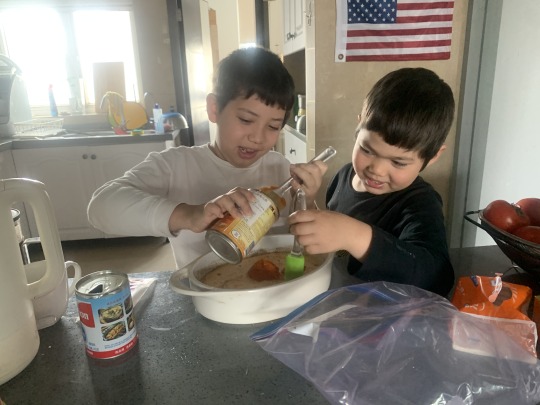
Also no complaints.
There are a lot of really cool things about this transition, but seeing my boys becoming friends again has got to be one of the best. They still have their conflicts, but the overall feeling of the house is moving toward harmony.
Sometimes I wonder if I’m doing the right thing, but then I watch the interaction between my boys and observe my own internal compass. They are happier. I am happier. And all of us are learning. I think this is the way to go—at least for us.
0 notes
Video
youtube
The Inner Compass Forecast ~ July 14th
It’s time to align with your truth and trust your path — one sacred step at a time.
Each week, I tune into the moon’s phase, pull cards from my two personal oracle decks and the tarot, and offer sacred self-care guidance to help you begin the week centered, clear, and in resonance with your inner wisdom.
This week's lunar influence is from a decisive Last Quarter Moon in the sign of Aries that arrives on the 17th... it brings with it a moment of sharp clarity and emotional urgency.
This isn’t just a forecast — it’s your invitation to come home to yourself. 🌙 Energetic themes 🃏 Oracle & tarot wisdom 🙏 Self-care reflections to support your journey 🧭 Inner compass activation
Watch this week’s episode now and let your soul lead the way.
#youtube#inner compass#oracle cards#tarot reading#sacred self-care#intuitive guidance#moon magic#weekly wisdom
0 notes
Text
Semana 3: Recuperando o Senso de Poder
17 A 30 DE JULHO DE 2023
Você está descobrindo seu poder, ao mesmo tempo que as amarras ilusórias do que antes considerava seus limites vão se desprendendo.
Raiva & vergonha são sentimentos que eu não exponho muito, não costumo nem desabafar com amigos sobre, mas sinto constantemente. Sei que não ter nenhum sentimento negativo é irreal, mas ao longo da vida fui me moldando a só mostrar aos outros o que sinto quando é algo positivo. Essa(s) (duas) semana(s) nos convida a não fugir de nenhum sentimento, escutá-los & nos transformarmos através deles.
Tive muito interesse nas atividades propostas, mas acabei socializando bastante & me sentindo exausta demais… Parei pra ouvir o que estava sentindo & percebi que estava com raiva por não conseguir ter tempo pra mim. A raiva nos diz quando nossos limites foram ultrapassados & eu sou muito boa em ignorar meus limites pelos outros. Há uns dois anos, tento me lembrar que se eu não me priorizar & cuidar de mim mesma primeiro, não serei capaz de ajudar aos outros como gostaria.
Mesmo que eu queira sair & explorar lugares como museus, há tanto acontecendo em minha vida atualmente que precisa de atenção - & que sinto que não dou conta - que “passear fora de casa” parece uma distração… Mas sei que preciso fazer isso!
Descrevi meu Quarto de Infância, mas acabei perdendo o foco… Qual era minha coisa favorita ali? & qual a minha coisa favorita em meu quarto atual? Isso é especialmente importante por eu ter me mudado recentemente - do apartamento em que meus pais moram, onde vivi por mais de 20 anos, para meu primeiro apartamento, meu cantinho com meu namorado. Não tenho nada favorito em meu quarto atual, mudarei isso em breve!
Listei 5 características de que gostava em mim mesma quando criança: questionadora, desinibida, criativa, aventureira & romântica.
Não consegui pensar em 5 realizações de minha infância, me veio apenas uma em mente… Mas listei as 5 comidas favoritas de minha infância & comprei 1 delas!
Uma atividade muito importante que acabei não fazendo é sobre hábitos, examinar meus costumes: Muitos deles podem interferir em sua capacidade de cuidar bem de si mesma & causar vergonha. O que eu ganho ao mantè-los? Qual a utilidade dessas formas de sabotagem?
Reservei uma hora para seguir minha bússola interna, fazendo uma atividade do cérebro artista & escutando as boas ideias que foram surgindo.
Não listei 5 pessoas que admiro (características a cultivar mais em mim mesma) nem 5 pessoas que gostaria de ter conhecido & que já morreram (características a procurar em meus amigos), mas pretendo. A ideia é perceber as coisas que eu realmente admiro & gosto - & as coisas que eu acho que deveria admirar & gostar.
Ainda não estou onde quero estar mas sei que esses sentimentos & insights são o início do meu processo de desbloqueio: um processo de me entender melhor, me permitir mais & me tornar a versão mais autêntica de mim mesma.
CHECAGEM SEMANAL
Quantas vezes fiz minhas páginas livres esta semana? Como foi a experiência? Como me senti? Se deixei de escrever um dia, porque fiz isso?
Escrevi em 12 dos 14 dias! Não escrevi na quinta por ter virado a noite em claro & dedicado o dia inteiro a meal prep. Rolou um rolê espontâneo na sexta à noite que me destruiu, eu basicamente nem existi no sábado então não rolou escrever… Mas consegui em todos os outros dias, me sinto vitoriosa!
Tive meu encontro com a artista esta semana? O que fiz? Como me senti?
Não rolou na primeira semana… Na segunda semana, marquei em minha agenda (com hora & tudo) um momento para aquarela, encaixado antes de outro compromisso fora de casa. Não defini previamente o que faria, só decidi que mexeria com aquarela. Quando chegou a hora do encontro, eu não me pressionei a fazer nada. Comecei fazendo swatches de cada uma das cores que tenho, depois brinquei um pouco com a tinta no mesmo papel, só. Foi bom relembrar a sensação de pintar & me deu um gostinho de quero mais por ter sido apenas 1 hora!
Vivenciei alguma forma de sincronicidade essa semana? O que foi?
Acho que a coisa mais parecida com sincronicidade que vivenciei foi ter me interessado em pintar biscoitos de madeira num dia & no dia seguinte, uma amiga enviou um reels que mostrava uma linda série de pinturas de fantasminhas, feitas em biscoitos de madeira. Isso certamente me deu um gás pra bolar um projeto pessoal de pinturinhas!
#desafio criativo#creative challenge#diário de leitura#o caminho do artista#reading journal#the artist's way#bússola interior#childhood bedroom#quarto de infância#inner compass
0 notes
Text
"Aziraphale, on the other hand, is still reacting with his ingrained Heavenly instincts - that he should follow his morals because they are 'right,'"
Yeah, I attended a lecture about humanity, and the lecturer confirmed, that the "inner compass" isn't enough to grow moral.
"Not Even At Gunpoint!"
Future Echoes of the Past #3
I didn't plan this meta. Well, maybe...just a tiny, weeny bit...I had been keeping a parallel in mind for a while...but not in this context. But it was kind of one of these moments:

Lets start at the beginning.
@beebopboom has been exploring the three magic tricks that appear in the S2 opening sequence recently, and speculating how the third one might appear in S3, and I've been exploring the paintball fight scene at Tadfield Manor in S1E2 and how that relates to the Great War in Heaven that formed Hell, and the events around the Fall. The two topics intersect, as you have echoes of the Bullet Catch magic trick from the 1941 minisode in S2E4 appearing not once but at least twice at Tadfield Manor.
But...then I realised, there's more than one pointed gun. Way more.
I'd always liked this throwback line from Crowley in S2E1, when Nina asks him if he is a bookseller as well:
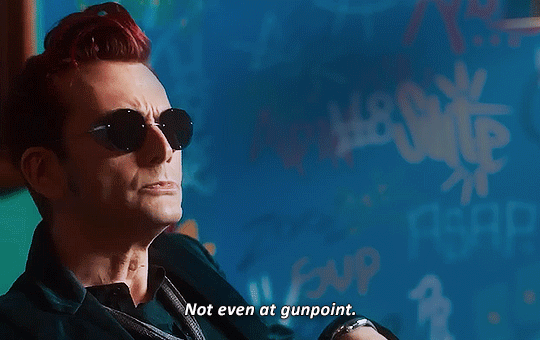
Who would want to be a bookseller when this could happen to you?
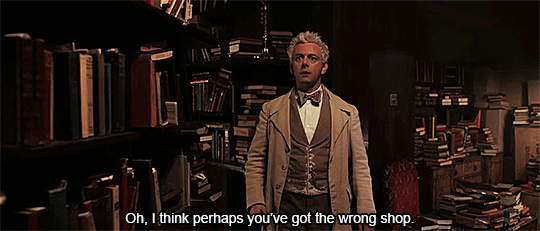
Shadwell, turning up at the book shop in S1E4, disturbs Aziraphale contacting Heaven through the portal (a modified Solomon's magic circle) under the oculus, and breaks in to confront him. The historical implications of Aziraphale's lines here are that before homosexuality was decriminalized in the UK meeting places for such people were often disguised as respectable looking book shops. Which makes Nina's question in S2E1 and Crowley's denial to her all the more...loaded? Ah, well, you can't fool Nina, now, can you?
Anyway, mah point is...Shadwell literally has Aziraphale at gunpoint, er, fingerpoint here. Loaded fingerpoint.
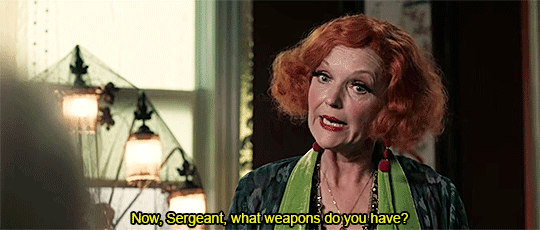
But then, this isn't the first time Aziraphale has had a gun pointed at him. He had one pointed at him in the church in 1941 by the Nazi agent double-crossing Greta. His biggest fear, as always, isn't actually "dying," or standing in front of the guns, its the paperwork that he knows will go with getting a new body from the Ineffable Bureaucracy.

Crowley turns up to rescue him, because he "didn't want to see [him] embarrassed." With a bit of equivocation between the two of them, all the time while at gunpoint from Greta, they team up to save each other.
This was even before we got to the Bullet Catch - his "show stopper!"

Back to Tadfield Manor.
As they enter, Crowley is lined up in the crosshairs.

Er, wait a minute...
Only Crowley is shown this way here, not Aziraphale. He's a target. I'm starting to ask what point in time this is referring to - the present or the past? Both. Yeah, why not both! The work I did in this previous meta in this series showed that Crowley was considered a target for early removal by the other demons-to-be prior to the Fall.
Then they are both shot.
I pointed out Aziraphale gets shot by blue paint, representing Heaven, but its a colour we don't see used again by any one in the fighting to come. But what I didn't talk about was WHERE he got hit - in the back. That's synonymous with treachery. Heaven has stabbed Aziraphale in the back, so to speak. wow. Nice - not.
And Crowley? He gets hit in the heart - just like the Norman/Lucifer parallel on the Yellow Team does a short while later during his "fall" scene - with the red paint, betrayed by the Red Team who represent the management in Heaven.
Seems the Ineffable Bureaucracy wanted both them out of the way during the Great War...it get more and more interesting each time I look closer at it...
So was Aziraphale ever in the crosshairs? Yep.

And, as @vavoom-sorted-art points out, this is a time Aziraphale chooses to pick a weapon, and to fight. He didn't want the simple, safe deception trick with the ropes - he wanted a weapon. He really is much more the warrior than Crowley. Aziraphale, I think your nature as a principality is showing!
Firing that gun made Crowley sick to his stomach, and so did this metaphorical loaded gun - the Book of Life.

As soon as he found out from Beelzebub it was a real possibility of being played he went back to protect Aziraphale. Crowley hates fighting - watch how often he will try shut it down as quickly as possible or try to escape it when he can. To him everyone has free will, and the person picking the fight with the other is imposing their will on them. That's 'not on' in his books.
Aziraphale, on the other hand, is still reacting with his ingrained Heavenly instincts - that he should follow his morals because they are 'right,' and more sophisticated weapons add weight to the moral argument. He thinks. Maybe. (Yeah, keep working on that doubt, angel.)
Az: Impressive hardware. I've looked at this gun, its not a proper one at all. It just shoots paintballs. Cr: Don't your lot disapprove of guns? Az: Unless they're in the right hands. Then they give weight to a moral argument. I think. Cr: [laughing] A moral argument? Really? *tosses gun away* C'mon. [Heads into the Manor.] [later, after Crowley changes the paintball guns to real guns...] Az: But there are people out there shooting at each other! Cr: Well - Lends weight to their moral argument. Everyone has free will, including the right to murder. Just think of it as a microcosm of the universe.
I'll think I'll end this here and leave you with a small montage of the aftermath of all this gun play - everything going up in flames and smoke.




Bring on S3!
If you didn't follow the links in the meta, and want to read the first two in this series, they are here:
#1: The Great War of Tadfield Manor
#2: The Newton/Crowley Mirror-Parallel in S1
112 notes
·
View notes